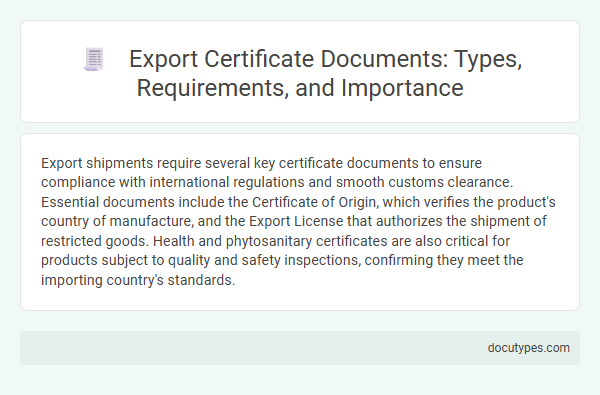Export shipments require several key certificate documents to ensure compliance with international regulations and smooth customs clearance. Essential documents include the Certificate of Origin, which verifies the product's country of manufacture, and the Export License that authorizes the shipment of restricted goods. Health and phytosanitary certificates are also critical for products subject to quality and safety inspections, confirming they meet the importing country's standards.
Introduction to Export Certificate Documents
Export shipments require specific certificate documents to ensure smooth customs clearance and regulatory compliance. Certificates such as the Certificate of Origin, Commercial Invoice, and Packing List play key roles in verifying the authenticity and details of the goods. Understanding these essential export certificate documents helps you prepare your shipments accurately and avoid delays.
Types of Export Certificate Documents
Export shipments require specific certificate documents to comply with international trade regulations and ensure smooth customs clearance. Different types of certificates serve various purposes such as authenticity, quality, and origin verification.
- Certificate of Origin - Confirms the country where the goods were manufactured or processed.
- Commercial Invoice - Details the transaction between the exporter and importer including product descriptions and values.
- Phytosanitary Certificate - Certifies that agricultural products meet plant health standards and are free from pests.
- Health Certificate - Verifies that food and animal products comply with safety and sanitary regulations.
- Export License - Authorizes the export of specific goods subject to government control.
- Bill of Lading - Acts as a receipt and contract for the transportation of goods by sea or air.
Correctly preparing these certificate documents helps expedite export procedures and minimizes shipment delays.
Commercial Invoice: Key Details
The commercial invoice is a critical document in export shipments, serving as a primary proof of sale between the exporter and importer. Its accuracy directly impacts customs clearance and the calculation of duties and taxes.
- Exporter and Importer Details - The invoice must clearly state the full names and addresses of both parties involved in the transaction.
- Description of Goods - A detailed description including quantity, unit price, and total value of the goods must be provided for customs assessment.
- Invoice Number and Date - Each invoice should have a unique number and issuance date to maintain proper order and traceability in official records.
Packing List Requirements
Packing list requirements are essential for export shipments to ensure accurate documentation and smooth customs clearance. This document details the contents, packaging, and shipment specifics, facilitating verification by authorities and recipients.
- Comprehensive item description - Each item must be clearly listed with detailed descriptions to avoid confusion during customs inspections.
- Accurate quantity and weight - The packing list should specify the exact quantity and weight of each package to verify shipment accuracy.
- Package identification - Every package should be uniquely identified with marks or numbers corresponding to the packing list to aid in tracking and handling.
Certificate of Origin Explained
Which certificate documents are essential for export shipments? Export shipments typically require a Certificate of Origin, commercial invoices, and packing lists to ensure smooth customs clearance. The Certificate of Origin verifies the country where the goods were manufactured, influencing tariffs and trade agreements.
What is a Certificate of Origin and why is it important? A Certificate of Origin is an official document declaring the country of manufacture of exported goods. This certificate helps customs authorities assess applicable duties and confirms compliance with trade regulations for your shipment.
Bill of Lading and Shipping Documentation
| Certificate Document | Description | Importance in Export Shipments |
|---|---|---|
| Bill of Lading | A legal document issued by the carrier to the shipper outlining details of the goods, shipment destination, and terms of carriage. | Serves as proof of shipment, contract of carriage, and document of title; essential for customs clearance and release of cargo. |
| Commercial Invoice | Itemizes the goods sold, including price, quantity, and terms of sale between buyer and seller. | Used by customs to assess duties and taxes; verifies transaction details and value of exported goods. |
| Packing List | Details the specifics of the shipment's contents, including weight, dimensions, and packaging type. | Facilitates cargo handling, inspection, and verification by customs and shipping agents. |
| Certificate of Origin | Certifies the country where the goods were manufactured or produced. | Required for customs to apply correct tariffs and determine eligibility for trade agreements. |
| Insurance Certificate | Proof of insurance coverage for the shipment against damage, loss, or theft. | Provides financial protection and assurance for exporters and importers in transit. |
Inspection and Quality Certificates
Inspection and quality certificates are essential documents for export shipments. These certificates verify that products meet specified standards and comply with import regulations in the destination country.
Inspection certificates confirm that goods have been examined for quality, quantity, and compliance before shipment. Quality certificates certify that products conform to industry standards, safety requirements, and customer specifications. Providing these documents ensures smoother customs clearance and enhances trust between exporters and importers.
Health and Safety Compliance Certificates
Health and safety compliance certificates are essential for export shipments to ensure products meet international safety standards. These certificates verify that goods have been inspected and comply with regulatory requirements related to health and safety.
You must obtain relevant health and safety certificates, such as sanitary certificates or product safety reports, depending on the destination country. Proper documentation helps prevent shipment delays and ensures smooth customs clearance during export.
Regulatory and Custom Requirements
Export shipments require specific certificate documents to comply with regulatory and customs requirements. These certificates ensure that your goods meet the legal standards of the destination country.
Common certificates include the Certificate of Origin, Commercial Invoice, and Packing List. Additional documents like Phytosanitary Certificates or Health Certificates may be required depending on the product type and destination regulations.
Which Certificate Documents Are Needed for Export Shipments? Infographic

